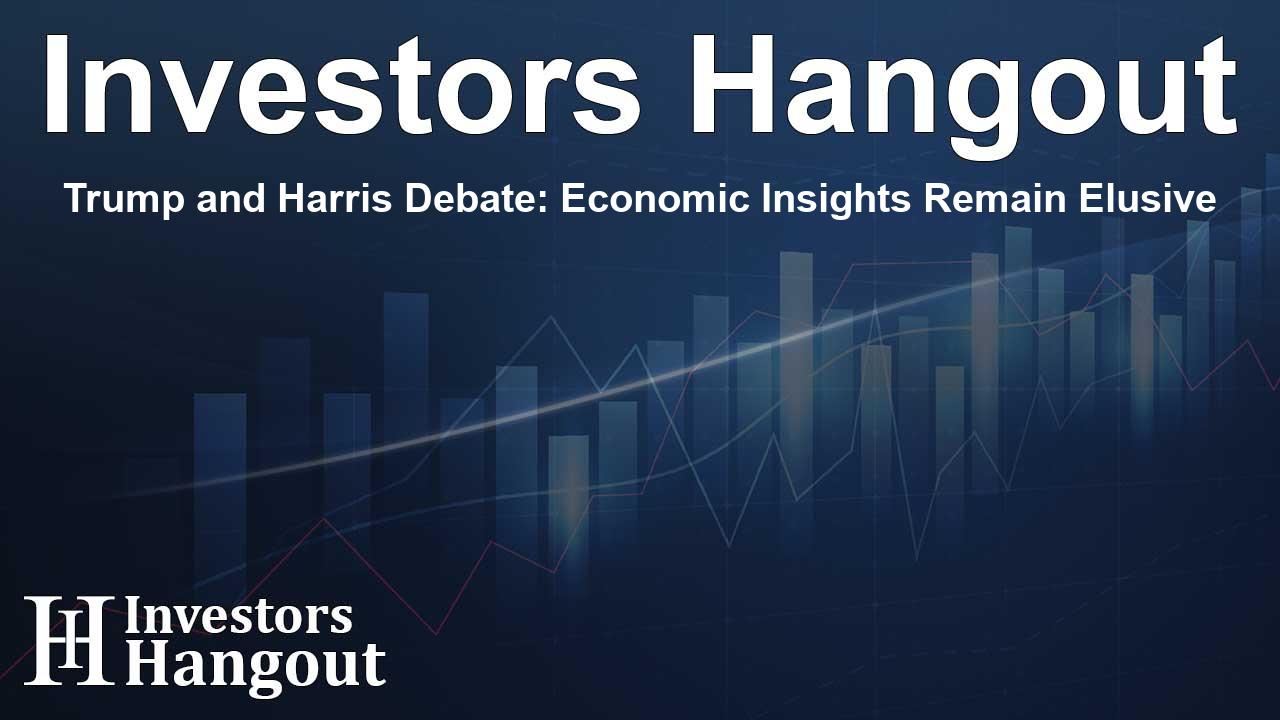Trump and Harris Debate: Economic Insights Remain Elusive

Trump and Harris Debate Overview
The recent debate between Republican presidential candidate Donald Trump and Democratic challenger Kamala Harris was filled with tension and conflict. They clashed on a variety of issues, including immigration, economic strategies, and taxation policies. However, once the heated exchanges concluded, the insights for investors were minimal, leaving many pondering how either candidate would address important economic topics.
Key Economic Discussions
This debate occurred against a backdrop of close national polls, where both candidates are vying for the same middle-ground voters. Investors had hoped to gain clarity on how tariff policies and taxation might shape the economic landscape under their leadership. Trump has emphasized a desire to cut corporate tax rates while implementing stricter tariffs, believing this approach would stimulate economic growth. Conversely, Harris has proposed increasing corporate taxes, potentially limiting profit margins.
Trump's Tax Strategy
Trump's tax strategy resonates with those advocating for reduced corporate taxes, forecasting possible increases in company profits. However, this method may inadvertently lead to inflationary pressure, prompting some analysts to evaluate the long-term effects on the economy.
Harris's Tax Perspective
On the debate stage, Harris criticized Trump’s approach, describing high tariffs as a hidden tax on middle-class Americans. In defending his stance, Trump argued that these tariffs would not inflate prices for consumers. Furthermore, he pointed to the inflation rates during Harris's time in the Biden administration as a counterpoint to her criticisms.
Impact on Currency and Trade Relations
The debates have also had implications for international relations, particularly with the Chinese yuan. The currency appears to have gained stability against the dollar as recent trade tensions have resurfaced the focus on tariffs and trade policies from Trump’s earlier presidency.
Analysts' Observations
Recent analysis from TD Cowen pointed out that the debate lacked substantial economic discourse. They emphasized that crucial questions regarding the involvement of the White House in setting interest rates and the implications of tariffs on inflation were notably absent. This lack of detail leaves both investors and voters without essential information for decision-making.
Public Sentiment After the Debate
In the immediate aftermath of the debate, predictions favored Harris, with her chances of winning rising from 53% to 56%. Sources like PredictIt noted this shift, indicating that many found her performance compelling. Analysts at BTIG observed that while Harris may have expanded her appeal to certain voters, the polarizing nature of the debate likely did little to change opinions among staunch supporters of either candidate.
Conclusion
As the campaign season progresses, the lack of detailed economic policy discussions during the debate raises significant concerns. Investors and voters alike are left craving more comprehensive understanding of how these candidates intend to govern and manage crucial economic issues. The stakes continue to rise as the election approaches, highlighting the importance of clarity in policy positions.
Frequently Asked Questions
What were the main topics discussed during the debate?
During the debate, key topics included immigration, the economy, tariffs, and taxation policies.
How did Trump and Harris differ in their economic policies?
Trump proposed cutting corporate taxes and implementing stricter tariffs, while Harris advocated for raising corporate taxes to enhance government revenue.
What was the immediate reaction from analysts following the debate?
Analysts noted a lack of substantive economic discussion and pointed out that both candidates failed to address critical economic questions.
How did the debate impact public perception of the candidates?
Polls indicated a slight increase in support for Harris after the debate, as many felt she effectively addressed undecided voters.
What are the implications for investors after this debate?
The lack of clarity on economic policies from both candidates leaves investors uncertain about future market conditions and regulatory environments.
About The Author
Contact Olivia Taylor privately here. Or send an email with ATTN: Olivia Taylor as the subject to contact@investorshangout.com.
About Investors Hangout
Investors Hangout is a leading online stock forum for financial discussion and learning, offering a wide range of free tools and resources. It draws in traders of all levels, who exchange market knowledge, investigate trading tactics, and keep an eye on industry developments in real time. Featuring financial articles, stock message boards, quotes, charts, company profiles, and live news updates. Through cooperative learning and a wealth of informational resources, it helps users from novices creating their first portfolios to experts honing their techniques. Join Investors Hangout today: https://investorshangout.com/
The content of this article is based on factual, publicly available information and does not represent legal, financial, or investment advice. Investors Hangout does not offer financial advice, and the author is not a licensed financial advisor. Consult a qualified advisor before making any financial or investment decisions based on this article. This article should not be considered advice to purchase, sell, or hold any securities or other investments. If any of the material provided here is inaccurate, please contact us for corrections.
